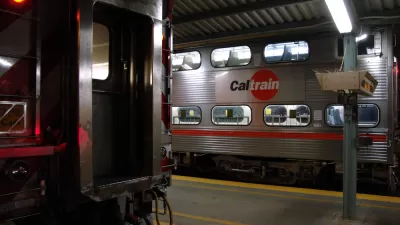Dwarfed by its city counterparts, the Bay Area's 1,000 bikes will cover a larger region (5 cities in 3 counties) with fewer bikes, many placed at key transit nodes. It also distinguishes itself by being a 'pilot program' with multiple public owners.
Environmental News Service writes that "the pilot is a part of the Metropolitan Transportation Commission’s Climate Initiatives Program that tests innovative projects for their ability to reduce greenhouse gas (GHG) emissions from transportation." Presumably that's why it's called a pilot - if it doesn't reduce GHGs, they won't continue funding it?
In fact, the Bike Sharing Pilot is listed as one of seventeen demonstration projects that OneBayArea, a collaboration of four regional government agencies: the Association of Bay Area Governments, Bay Area Air Quality Management District, San Francisco Bay Conservation and Development Commission and MTC, has awarded with "innovative grants".
The Bay Area Bike Share pilot program will go live on August 29 with 700 bikes at 70 stations in five cities – San Francisco, Redwood City, Palo Alto, Mountain View and San Jose. [See map of stations.] For the second phase, 300 additional bikes and 30 kiosks will be added in the first quarter 2014 to reach the full pilot complement of 1,000 bikes and 100 stations.
These locations correspond somewhat with the multiple managers of the pilot that include MTC, "Bay Area Air Quality Management District, and local government agencies – the City and County of San Francisco, SamTrans, Caltrain, the County of San Mateo, the City of Redwood City and the Santa Clara Valley Transportation Authority." The five cities are also all located on the Caltrain commuter rail line that runs 47.5 miles from San Francisco down the Peninsula to San Jose.
KQED's Bryan Goebel wrote on August 12 that "San Jose become [sic] the first city to install docking stations."
It costs $88 for an annual pass, $22 for three days or $9 for a day. Each pass includes costs for the first 30 minutes of a trip, with surcharges on trips that exceed that time limit.
Will San Francisco break away and launch it's own project?
Streetsblog's Aaron Bialick wrote in March that at least one San Francisco leader, disappointed with the "minisucle" 350 bikes (out of 700 in the initial launch) in his city, may take matters into his own hands.
"Supervisor Scott Wiener says San Francisco needs to take the initiative to move ahead and launch a “full-scale system” throughout the city by next year.
Wiener plans to introduce a resolution [PDF] at today’s Board of Supervisors meeting calling on the SF Municipal Transportation Agency to move beyond the pilot being planned by the Bay Area Air Quality Management District and launch a citywide bike-share system by 2014.
FULL STORY: San Francisco Bay Area Gears Up for Bike Sharing

Planetizen Federal Action Tracker
A weekly monitor of how Trump’s orders and actions are impacting planners and planning in America.

Restaurant Patios Were a Pandemic Win — Why Were They so Hard to Keep?
Social distancing requirements and changes in travel patterns prompted cities to pilot new uses for street and sidewalk space. Then it got complicated.

Map: Where Senate Republicans Want to Sell Your Public Lands
For public land advocates, the Senate Republicans’ proposal to sell millions of acres of public land in the West is “the biggest fight of their careers.”

Maui's Vacation Rental Debate Turns Ugly
Verbal attacks, misinformation campaigns and fistfights plague a high-stakes debate to convert thousands of vacation rentals into long-term housing.

San Francisco Suspends Traffic Calming Amidst Record Deaths
Citing “a challenging fiscal landscape,” the city will cease the program on the heels of 42 traffic deaths, including 24 pedestrians.

California Homeless Arrests, Citations Spike After Ruling
An investigation reveals that anti-homeless actions increased up to 500% after Grants Pass v. Johnson — even in cities claiming no policy change.
Urban Design for Planners 1: Software Tools
This six-course series explores essential urban design concepts using open source software and equips planners with the tools they need to participate fully in the urban design process.
Planning for Universal Design
Learn the tools for implementing Universal Design in planning regulations.
Heyer Gruel & Associates PA
JM Goldson LLC
Custer County Colorado
City of Camden Redevelopment Agency
City of Astoria
Transportation Research & Education Center (TREC) at Portland State University
Camden Redevelopment Agency
City of Claremont
Municipality of Princeton (NJ)





























